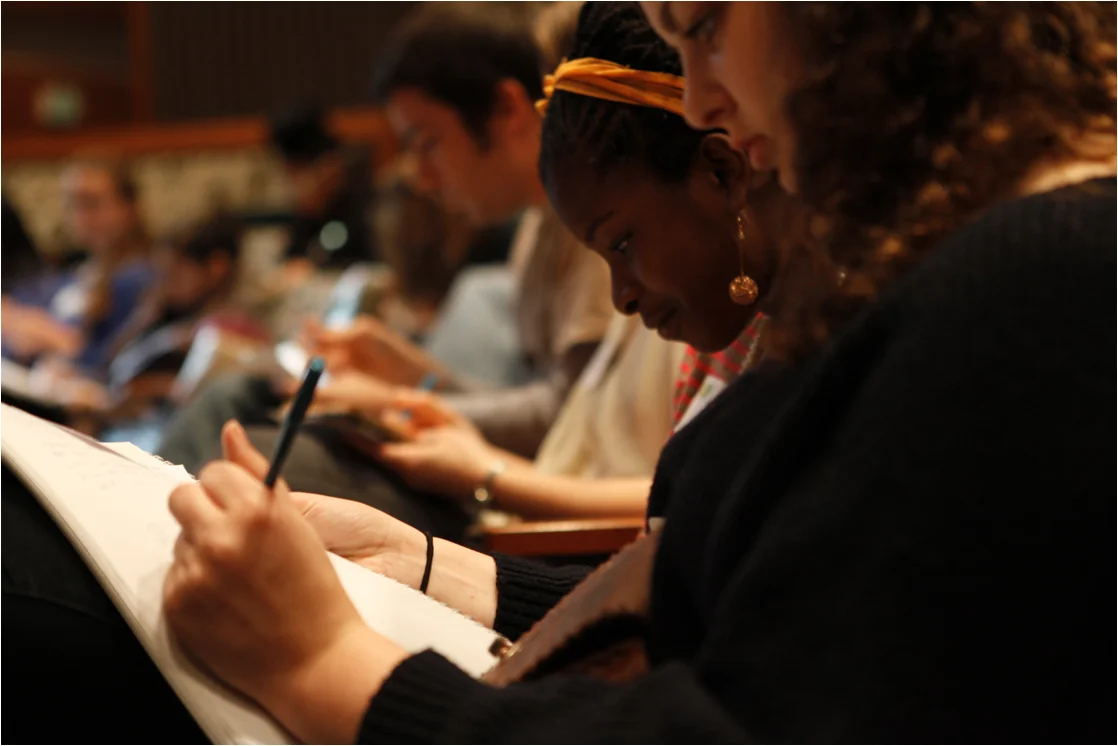WriteGirl attends Writer's Digest Novel Writing Conference
/Expand your story! Go out and have fun.
Clara, age 17
Listening to agents, writers, and publishers, we WriteGirl Interns got the chance to learn more about the art of novel writing at the Writer's Digest Novel Writing Conference. At the conference, which took place from August 15th to August 17th, we attended mini-seminars from diverse perspectives within the novel-writing business. Some pointers were about the craft of writing while others were about the publishing process. Here are some highlights.
One. The reader should fall into the story at the introduction, as if the story is a "river that is already flowing." This means the reader does not have to know a character’s entire background information from the very beginning. Deborah Halverson, author of Honk if You Hate Me and several books about writing, discussed why falling into a character's life is generally more interesting than viewing the main points laid out like a map. By diving right into an action scene, a writer can create suspense and slowly reveal information to the reader. A writer can dangle important information just out of reach—just on the next page.
Two. The main character doesn't live in a utopia. If too much time is spent describing a main character living a perfect life, there is no problem. As writers, we tend to feel close to our characters, but we have to let them struggle. If the characters are likable and they continue to struggle, a reader is more likely to hold on until the end in order to find out whether or not the protagonist overcomes.
Three. Writing the novel is only half the battle, but it is the most important part of the battle. Literary Agent Carlie Webber explained the long, and often times disheartening, publishing process. Before your book hits the bookstores, bookstores must express interest. Even before then, query letters must be written to find agents. Though this is all important, it is more important to have an exciting book first. Josh Malerman, author of Birdbox, spent years writing several books, but only took one to the publishing process. Even though the marketing part of novel writing takes a while, the writing part takes even longer. It might be tempting to think about your books lining the shelves, but this is more likely to happen if you perfect your novel before anything else.
Writing tip: Don't forget to go out and have fun! Inspiration might lurk at Yosemite National Park, a nearby coffee shop, or even a New York subway. Not only do outings allow writers to take a break, but they might provide unexpected ideas another great novel.
Knowledge is power! Embrace being a life long learner.
Addissyn, age 15
About a month ago, a few WriteGirl interns had the fantastic opportunity to attend the Writer’s Digest Novel Writing Conference. The conference was a little like an extended WriteGirl workshop. I think I am speaking for all of us interns who attended when I say we had a blast and learned a lot about writing. In those three days, there were so many individual workshops to attend; that we couldn’t attend all of them despite our impressive efforts. From the ones we did attend, though, we learned a lot. The following are the top three most noteworthy things that we experienced at the Novel Writing Conference. 1. Meeting other authors. We were the youngest attendees there was a wide range of ages and experience levels among the authors. The oldest author there was a person in retirement! One author told us about her current project that involved a teenage mother in a federal prison, how good does that sound? Each author had a different opinion and strategies that we could try to make our novel better. One author said skip the parts people don’t read. If you don’t read the facts and background information that isn’t necessary: don’t put it in your own novel. Another tip was be specific, as WriteGirl is always telling us. We want to hear about the fact that your character got a whole pizza to themselves because no one else liked her toppings. What was on it? What did everyone else get? Where did they get it? Is this a regular occurrence? Grill your characters and your story until you know what their bones are made of.
I realized that WriteGirl provided us with a career head start. Through the willpower for storytelling that we were born with, school, and WriteGirl, we as mentees have this incredible advantage over adults who haven’t gone to school in ten to twenty years and have only just found their voice. We write multiple essays a month, how much harder can a query letter be with a good proofreader? Not much. The other authors told us how happy they were to see us at the conference, and while we were the youngest and often were the subject of photographs, we felt like we belonged there. WriteGirl has helped us in finding our voice and exploring who we are as well as what style of writing we are good at. We have been set up to be great young authors!
Learning. More than eating delicious breakfasts and talking to other authors who want to hear our stories, we all wrote pages of notes. Everything every speaker said will benefit our school work now and future writing. For example, one speaker told us to know the history of genre you are writing in. This applies to school because no matter what project you are doing whether it is about you or France, you have to know EVERYTHING and have ALL information on hand. Writing is just the same. Read the classics in the genre you write and realize why they are good. Knowledge is king and it will help make your writing stronger because you will be writing about something you understand. The best writing advice I received at the conference was to never stop writing and never limit yourself. You are not restricted to one social platform or one specific genre. Use non fiction and poetry pieces in newspapers, magazines or to make a name for your up and coming fantasy novel. The world really is an oyster for you to shape with the words you send out. And, finally, I learned to always, no matter what circumstances, be yourself because no one can write you better than you can.
It's all about perspective! Use what's around you.
Jacqueline, age 17
Opening up my email account, I was surprised to see an email from WriteGirl inviting mentees to attend the Writer’s Digest Novel Writing Conference for free. Every writer knows what Writer’s Digest is; it’s one of the most established sources in the industry. And me, a seventeen year old with the possibility of being surrounded by professional, experienced writers? I jumped at the chance to go. In the days leading up to the conference I was excited to know that I’d be surrounded by professional writers. Writer’s who, through trial and error, still found that this is where they wanted to be in life. These were people who had experience with writing and editing and getting their work published. Some of them had even had books published.
My first workshop was about showing vs. telling: exposition vs. sensory details. The speaker told us to ask ourselves one question as we wrote our stories: If this were a movie what would the camera be able to see it? This is something that had been reiterated to me repeatedly at school and previous writing workshops but hearing him give examples of what to do and what not to do when describing scenes in stories made the whole thing make more sense. I saw what I was doing wrong in my writing but more than that, I saw the path that I needed to take to fix it. For example, the speaker told us that writing out a scene from a silent film helps due to the fact that the film has no dialogue, no thoughts. Actions only.
Our second workshop was called “Finding Your Voice and Your Subject” led by David Norrell, the author of Rambo. He explained to us that oftentimes, the author’s personal life was woven into his books. That some stories are about our dominant emotions whether it be love, anger or sadness. These things happened unconsciously sometimes, with the author’s life paralleling that of his or her main character’s. And above all else, Norrell told us to be honest about the material we wrote about. It must be interesting enough and important enough to be worth all that time and hard work. His words resonated with me and put things into perspective.
Going to the Writer’s Digest conference did just that: it put things in perspective. Afterwards, I came home, inspired. I looked over the notes that I had taken that day and worked on the exercises that the speakers had give to the audience. I still use some of their exercises when I’m feeling stuck and confused with my own writing and so far, it has been able to pull me out of every “writer’s problem” I have gone through.




